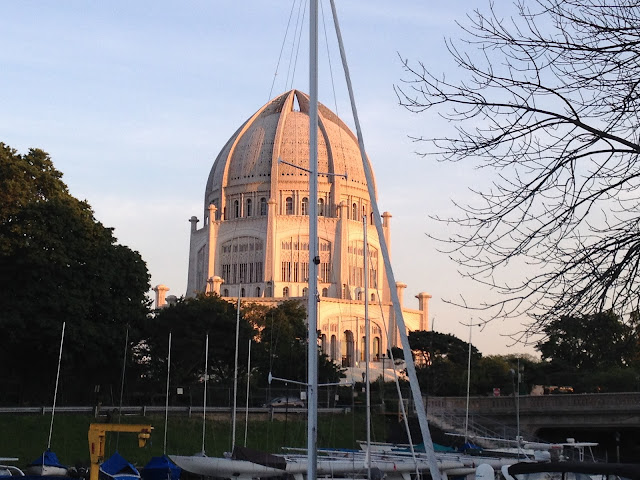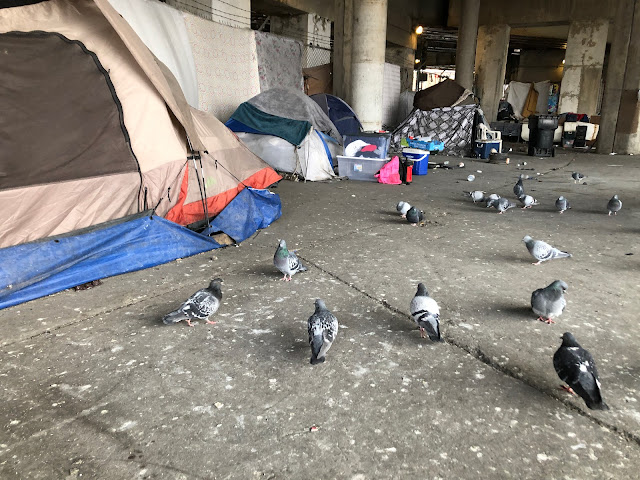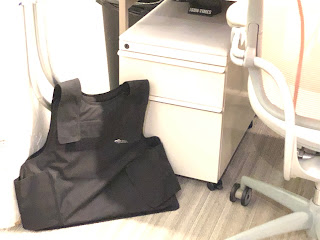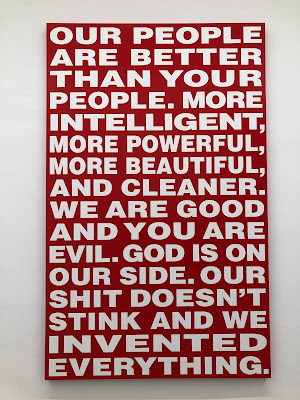Poetry is the fire axe behind glass, the bottle of water in your backpack, the thing you reach for when you need to reach for something, and I was glad to see Caren Jeskey bookend her Saturday essay with a pair of powerful poems.
Acquainted with the Night
I have been one acquainted with the night.
I have walked out in rain—and back in rain.
I have outwalked the furthest city light.
I have looked down the saddest city lane.
I have passed by the watchman on his beat
And dropped my eyes, unwilling to explain.
I have stood still and stopped the sound of feet
When far away an interrupted cry
Came over houses from another street,
But not to call me back or say good-bye;
And further still at an unearthly height,
One luminary clock against the sky
Proclaimed the time was neither wrong nor right.
I have been one acquainted with the night.
—Robert Frost
Skeins of unwoven yarn and instruments unplayed pepper the corners and gather dust on the shelves of our pandemic homes. After a few months of learning chords, a guitar hangs unplayed behind a friend as we Zoom. She guiltily explains that she stopped playing after a few months of lessons. Others mention undone projects that fizzled out. Unused packets of bread making yeast are being frantically given away in neighborhood sharing groups before they expire. Indoor gardeners are pawning off a preponderance of aloe pups and clippings from prolific Wandering Dudes.
Folks are afraid to tell their friends, when asked, “I laid in bed and watched Netflix for four hours,” or “I scrolled Facebook for most of the morning," or “I ate three bowls of cereal and went to sleep.” However, they will proudly share if they spent a couple hours reading an actual book or another “worthy” endeavor. They feel ashamed at their lack of productivity and as though are being scrutinized by social media or another eye in the sky at all times, won’t often share about the amount of time spent vegging out or simply resting.
I heard on NPR the other day that during the Great Depression, Americans were urged to take up hobbies. This was partly classist. It’s hard to take up a hobby when waiting in breadlines and coming home to hungry babies, not to mention little to no means for crafting, cooking, or musical supplies.
Hobbies are a good idea though. Not the kind you spend too much money on and never touch again after the initial good intentions and energy. Baby steps are fine too. A hobby can be cloud gazing. Counting the different kinds of mullions you see on a brisk winter walk, on a bus or train, or in the passenger’s seat of a car. Meditating. Just stopping.
After days of isolation mostly indoors save the occasional walk, due to an avalanche of work and not enough sleep, I was overjoyed that I had to drive to Wilmette for an errand on Thursday. I took Sheridan Road and ogled the frozen white water at the bend by Calvary Cemetery. I kept within the 15-25 mph speed limit past stately houses and patches of lakefront, and felt soothed. When stressors tried to creep back in, the freedom of driving on a sunny day brought me to the perfect moment.
I curved around the magnificent form of the Baha'i Temple and by then all of my mental clutter was gone. It was just me, my clean car—since we had stopped for a $3 wash—and a gorgeous 16 degree day, driver’s window down for some real sun rays. On the way back I stopped and contemplated the brilliant white iced-over lake from the deck of the Lighthouse Beach.
I have walked out in rain—and back in rain.
I have outwalked the furthest city light.
I have looked down the saddest city lane.
I have passed by the watchman on his beat
And dropped my eyes, unwilling to explain.
I have stood still and stopped the sound of feet
When far away an interrupted cry
Came over houses from another street,
But not to call me back or say good-bye;
And further still at an unearthly height,
One luminary clock against the sky
Proclaimed the time was neither wrong nor right.
I have been one acquainted with the night.
—Robert Frost
Skeins of unwoven yarn and instruments unplayed pepper the corners and gather dust on the shelves of our pandemic homes. After a few months of learning chords, a guitar hangs unplayed behind a friend as we Zoom. She guiltily explains that she stopped playing after a few months of lessons. Others mention undone projects that fizzled out. Unused packets of bread making yeast are being frantically given away in neighborhood sharing groups before they expire. Indoor gardeners are pawning off a preponderance of aloe pups and clippings from prolific Wandering Dudes.
Folks are afraid to tell their friends, when asked, “I laid in bed and watched Netflix for four hours,” or “I scrolled Facebook for most of the morning," or “I ate three bowls of cereal and went to sleep.” However, they will proudly share if they spent a couple hours reading an actual book or another “worthy” endeavor. They feel ashamed at their lack of productivity and as though are being scrutinized by social media or another eye in the sky at all times, won’t often share about the amount of time spent vegging out or simply resting.
I heard on NPR the other day that during the Great Depression, Americans were urged to take up hobbies. This was partly classist. It’s hard to take up a hobby when waiting in breadlines and coming home to hungry babies, not to mention little to no means for crafting, cooking, or musical supplies.
Hobbies are a good idea though. Not the kind you spend too much money on and never touch again after the initial good intentions and energy. Baby steps are fine too. A hobby can be cloud gazing. Counting the different kinds of mullions you see on a brisk winter walk, on a bus or train, or in the passenger’s seat of a car. Meditating. Just stopping.
After days of isolation mostly indoors save the occasional walk, due to an avalanche of work and not enough sleep, I was overjoyed that I had to drive to Wilmette for an errand on Thursday. I took Sheridan Road and ogled the frozen white water at the bend by Calvary Cemetery. I kept within the 15-25 mph speed limit past stately houses and patches of lakefront, and felt soothed. When stressors tried to creep back in, the freedom of driving on a sunny day brought me to the perfect moment.
I curved around the magnificent form of the Baha'i Temple and by then all of my mental clutter was gone. It was just me, my clean car—since we had stopped for a $3 wash—and a gorgeous 16 degree day, driver’s window down for some real sun rays. On the way back I stopped and contemplated the brilliant white iced-over lake from the deck of the Lighthouse Beach.
We have learned that stressors of our world community can become a formless, faceless behemoth. Only the very privileged are less scathed by what’s happening down on the ground. The rental market is out of control. Everyone seems to have COVID (thank goodness, not me, but I can’t count the people in my life who do). Medical staff are quitting in droves and have been completely traumatized. Folks still don’t get it and continue to take risks. I get it, but it seems to speak to delusion, diagnosable folie à deux.
On the up side, this could be a world war, and it’s not, even if it feels that way sometimes.
I believe that finding oneself in this mess is the key. If we can do that, we can live more mindfully. We can accept our limitations and use our power to affect the changes that we can. I long for a world movement of refining our senses. Instead, I fear that the collective nightmare of this pandemic will end with us being in worse shape that we were before.
This week I’ve had great challenges that might have completely robbed me of my peace in the past. What saved me was knowing that my inner partner was always there for me. She had my back. She reminded me that the only way out of a mess is to clear the clutter.
On Wednesday night I took the time to watch a documentary film Five Years North about the journey of a young man named Luis. I knew I had to make this small effort (rather than my guilty pleasure Hulu show that makes me laugh my butt off) to remind me that the world is full of people who have much, much less than I do and I have to remember that in order to stay grateful for all I do have. To appreciate my life and my loved ones now. This is not a dress rehearsal.
Luis was sixteen when he took the harrowing journey from his small Mayan village in Guatemala to New York City. He spent the next several years working from before dawn until well after dusk to pay his smugglers so that his family in Guatemala would not lose their home. It was more than $20,000. Then he stayed so that he could continue sending money home so his sisters could go to school. One washed dish at a time. He then became a line cook and moved up to being a chef. He may have prepared a meal for me or you one day when traveling was safe.
Yes, the world is overpopulated. Yes, it’s a sacrifice to care for others.
What is the purpose of being on this earth? The one good thing this pandemic has done for many of us is to reset and turn back to the simplest things in life. From a place of calm grounding we can move mountains if we try.
While Ms. Plath in the words below does not seem to see her worth, I feel she cuts to the quick of the starkness of life. And death.
Poppies in October
Even the sun-clouds this morning cannot manage such skirts.
Nor the woman in the ambulance
On the up side, this could be a world war, and it’s not, even if it feels that way sometimes.
I believe that finding oneself in this mess is the key. If we can do that, we can live more mindfully. We can accept our limitations and use our power to affect the changes that we can. I long for a world movement of refining our senses. Instead, I fear that the collective nightmare of this pandemic will end with us being in worse shape that we were before.
This week I’ve had great challenges that might have completely robbed me of my peace in the past. What saved me was knowing that my inner partner was always there for me. She had my back. She reminded me that the only way out of a mess is to clear the clutter.
On Wednesday night I took the time to watch a documentary film Five Years North about the journey of a young man named Luis. I knew I had to make this small effort (rather than my guilty pleasure Hulu show that makes me laugh my butt off) to remind me that the world is full of people who have much, much less than I do and I have to remember that in order to stay grateful for all I do have. To appreciate my life and my loved ones now. This is not a dress rehearsal.
Luis was sixteen when he took the harrowing journey from his small Mayan village in Guatemala to New York City. He spent the next several years working from before dawn until well after dusk to pay his smugglers so that his family in Guatemala would not lose their home. It was more than $20,000. Then he stayed so that he could continue sending money home so his sisters could go to school. One washed dish at a time. He then became a line cook and moved up to being a chef. He may have prepared a meal for me or you one day when traveling was safe.
Yes, the world is overpopulated. Yes, it’s a sacrifice to care for others.
What is the purpose of being on this earth? The one good thing this pandemic has done for many of us is to reset and turn back to the simplest things in life. From a place of calm grounding we can move mountains if we try.
While Ms. Plath in the words below does not seem to see her worth, I feel she cuts to the quick of the starkness of life. And death.
Poppies in October
Even the sun-clouds this morning cannot manage such skirts.
Nor the woman in the ambulance
Whose red heart blooms through her coat so astoundingly —
A gift, a love gift
Utterly unasked for
By a sky
Palely and flamily
Igniting its carbon monoxides, by eyes
Dulled to a halt under bowlers.
O my God, what am I
That these late mouths should cry open
In a forest of frost, in a dawn of cornflowers.
—Sylvia Plath
A gift, a love gift
Utterly unasked for
By a sky
Palely and flamily
Igniting its carbon monoxides, by eyes
Dulled to a halt under bowlers.
O my God, what am I
That these late mouths should cry open
In a forest of frost, in a dawn of cornflowers.
—Sylvia Plath









